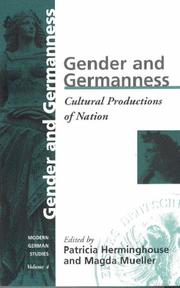| Listing 1 - 10 of 12 | << page >> |
Sort by
|

ISBN: 1571811125 1785330071 1571811133 Year: 1997 Volume: v. 4 Publisher: Providence : Berghahn books,
Abstract | Keywords | Export | Availability | Bookmark
 Loading...
Loading...Choose an application
- Reference Manager
- EndNote
- RefWorks (Direct export to RefWorks)
Cultural Studies have been preoccupied with questions of national identity and cultural representations. At the same time, feminist studies have insisted upon the entanglement of gender with issues of nation, class, and ethnicity. Developments in the wake of German unification demand a reassessment of the nexus of gender, Germanness and nationhood. The contributors to this volume pursue these strands of the cultural debate in German history, literature, visual arts, and language over a period of three hundred years in sections devoted to History and the Canon, Visual Culture, Germany and Her "Others," and Language and Power. Contributors: L. Adelson, A. Taylor Allen, K. Bauer, R. Berman, B. Byg, M. Denman, E. Frederiksen, S. Friedrichsmeyer, E. Kaufmann, L. Koepnick, B. Kosta, S. Lefko, A. M.O'Sickey, B. Mennel, H. M. Müller, B. Peterson, L. Pusch, D. Sweet, H. Watt, S. Zantop.
German literature --- Gender identity in literature. --- Nationalism in literature. --- Arts, German. --- Gender identity in art. --- Littérature allemande --- Identité sexuelle dans la littérature --- Nationalisme dans la littérature --- Arts allemands --- Identité sexuelle dans l'art --- History and criticism. --- Histoire et critique --- Germany --- Allemagne dans la littérature --- Allemagne --- In literature. --- Civilization --- Civilisation --- Littérature allemande --- Identité sexuelle dans la littérature --- Nationalisme dans la littérature --- Identité sexuelle dans l'art --- Allemagne dans la littérature --- German arts

ISBN: 1571811133 Year: 1997 Publisher: Providence : Berghahn books,
Abstract | Keywords | Export | Availability | Bookmark
 Loading...
Loading...Choose an application
- Reference Manager
- EndNote
- RefWorks (Direct export to RefWorks)
Book
ISBN: 058502250X 9780585022505 Year: 1992 Publisher: [Place of publication not identified] University of Nebraska Press
Abstract | Keywords | Export | Availability | Bookmark
 Loading...
Loading...Choose an application
- Reference Manager
- EndNote
- RefWorks (Direct export to RefWorks)
Book
ISBN: 0585022879 9780585022871 Year: 1992 Publisher: [Place of publication not identified] University of Nebraska Press
Abstract | Keywords | Export | Availability | Bookmark
 Loading...
Loading...Choose an application
- Reference Manager
- EndNote
- RefWorks (Direct export to RefWorks)
Book
ISBN: 0857451685 1845455479 1282627333 9786612627330 1845458664 9780857451682 0857453882 Year: 2008 Publisher: New York : Berghahn Books,
Abstract | Keywords | Export | Availability | Bookmark
 Loading...
Loading...Choose an application
- Reference Manager
- EndNote
- RefWorks (Direct export to RefWorks)
While the first decade after the fall of the Berlin wall was marked by the challenges of unification and the often difficult process of reconciling East and West German experiences, many Germans expected that the "new century" would achieve "normalization." The essays in this volume take a closer look at Germany's new normalcy and argue for a more nuanced picture that considers the ruptures as well as the continuities. Germany's new generation of writers is more diverse than ever before, and their texts often not only speak of a Germany that is multicultural but also take a more playful attitude toward notions of identity. Written with an eye toward similar and dissimilar developments and traditions on both sides of the Atlantic, this volume balances overviews of significant trends in present-day cultural life with illustrative analyses of individual writers and texts.
German literature -- 20th century -- History and criticism. --- German literature -- 21st century -- History and criticism. --- German literature -- Europe, German-speaking -- History and criticism. --- German literature -- Appreciation -- Europe, German-speaking. --- Europe, German-speaking -- Intellectual life -- 20th century. --- Europe, German-speaking -- Intellectual life -- 21st century. --- United States -- Intellectual life -- 20th century. --- German literature --- History and criticism. --- Appreciation --- Europe, German-speaking --- United States --- Intellectual life --- German-speaking Europe --- Germanophone Europe --- German literature - 20th century - History and criticism --- German literature - 21st century - History and criticism --- German literature - Europe, German-speaking - History and criticism --- German literature - Appreciation - Europe, German-speaking --- Europe, German-speaking - Intellectual life - 20th century --- Europe, German-speaking - Intellectual life - 21st century --- United States - Intellectual life - 20th century --- United States - Intellectual life - 21st century
Book
ISBN: 3518107798 9783518107799 Year: 1981 Publisher: Frankfurt a. M.: Suhrkamp,
Abstract | Keywords | Export | Availability | Bookmark
 Loading...
Loading...Choose an application
- Reference Manager
- EndNote
- RefWorks (Direct export to RefWorks)
Book

ISBN: 9781845458669 Year: 2008 Publisher: New York Oxford
Abstract | Keywords | Export | Availability | Bookmark
 Loading...
Loading...Choose an application
- Reference Manager
- EndNote
- RefWorks (Direct export to RefWorks)
Multi

ISBN: 9781845458669 Year: 2008 Publisher: New York; ; Oxford Berghahn Books
Abstract | Keywords | Export | Availability | Bookmark
 Loading...
Loading...Choose an application
- Reference Manager
- EndNote
- RefWorks (Direct export to RefWorks)
Book

ISBN: 9781785330070 Year: 1998 Publisher: New York Oxford
Abstract | Keywords | Export | Availability | Bookmark
 Loading...
Loading...Choose an application
- Reference Manager
- EndNote
- RefWorks (Direct export to RefWorks)
Multi

ISBN: 9781785330070 Year: 1998 Publisher: New York; ; Oxford Berghahn Books
Abstract | Keywords | Export | Availability | Bookmark
 Loading...
Loading...Choose an application
- Reference Manager
- EndNote
- RefWorks (Direct export to RefWorks)
| Listing 1 - 10 of 12 | << page >> |
Sort by
|

 Search
Search Feedback
Feedback About UniCat
About UniCat  Help
Help News
News